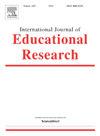STEM教师在STEM教育中促进性别平等的作用:一项混合方法研究
IF 2.5
3区 教育学
Q1 EDUCATION & EDUCATIONAL RESEARCH
引用次数: 0
摘要
科学、技术、工程和数学(STEM)领域的全球性别差距阻碍了创新和经济进步。本研究探讨了一个与政策相关的主题,即哈萨克斯坦STEM教师在STEM教育中促进性别平等的机构。在哈萨克斯坦,女孩在学校擅长STEM,但在STEM专业中代表性不足。然而,哈萨克斯坦教师的性别相关实践和观点仍未得到充分探讨。借鉴后结构主义关于性别和教师代理的概念,本研究采用混合方法探索性顺序设计,结合个人半结构化访谈、定性课程观察和调查回应。学校和教师的选择能够根据农村或城市位置、教学媒介和学科专业等因素调查教师的观点和实践的差异。调查结果显示,老师们对性别有着本质上的信念,把女孩描绘成低人一等的学习者,尤其是在物理和计算机科学方面。虽然认识到STEM中的性别差异,但许多教师并没有将女性代表性不足视为一个重大问题,也没有意识到她们在挑战性别刻板印象和规范方面的实际作用。相反,他们依靠民族/文化话语和本质化的性别解释来证明现状的合理性,放弃了他们潜在的性别平等机构。教师教育缺乏对性别平等的重视,进一步限制了教师解决这些问题的能力。该研究为政策制定者、课程开发人员和学校领导培养STEM领域性别平等的教师机构提供了全面的启示。最终,教师对性别问题的认识和反思对他们在STEM领域实现性别平等的行动至关重要。本文章由计算机程序翻译,如有差异,请以英文原文为准。
STEM teachers’ agency for gender equality in STEM education: A mixed-methods study
The global gender gap in science, technology, engineering, and mathematics (STEM) fields hinders innovation and economic progress. This study explores a policy-relevant topic, STEM teachers’ agency for gender equality within STEM education in Kazakhstan, where girls excel in STEM at school but are underrepresented in STEM majors. Nevertheless, the gender-related practices and perspectives of Kazakhstani teachers remain significantly unexplored. Drawing on poststructuralist conceptualisations of gender and teacher agency, the research utilises a mixed-methods exploratory sequential design, combining individual semi-structured interviews, qualitative lesson observations, and survey responses. The selection of schools and teachers enabled the investigation of differences in teachers’ perspectives and practices based on factors such as rural or urban location, medium of instruction and subject specialisations. Findings revealed that teachers held essentialised beliefs about gender, portraying girls as inferior learners, particularly in Physics and Computer Science. While recognising gender disparities in STEM, many teachers did not see women's underrepresentation as a significant issue and lacked awareness of their agentic role in challenging gender stereotypes and norms. Instead, they relied on national/cultural discourses and essentialised gender explanations to justify the status quo, relinquishing their potential agency for gender equality. The lack of emphasis on gender equality in teacher education further limits teachers’ agency in addressing these issues. The study offers comprehensive implications for policymakers, curriculum developers and school leaders in fostering teacher agency for gender equality in STEM. Ultimately, teachers’ awareness and reflection on gender issues are critical to their action for gender equality in STEM.
求助全文
通过发布文献求助,成功后即可免费获取论文全文。
去求助
来源期刊

International Journal of Educational Research
EDUCATION & EDUCATIONAL RESEARCH-
CiteScore
6.20
自引率
3.10%
发文量
141
审稿时长
21 days
期刊介绍:
The International Journal of Educational Research publishes regular papers and special issues on specific topics of interest to international audiences of educational researchers. Examples of recent Special Issues published in the journal illustrate the breadth of topics that have be included in the journal: Students Perspectives on Learning Environments, Social, Motivational and Emotional Aspects of Learning Disabilities, Epistemological Beliefs and Domain, Analyzing Mathematics Classroom Cultures and Practices, and Music Education: A site for collaborative creativity.
 求助内容:
求助内容: 应助结果提醒方式:
应助结果提醒方式:


